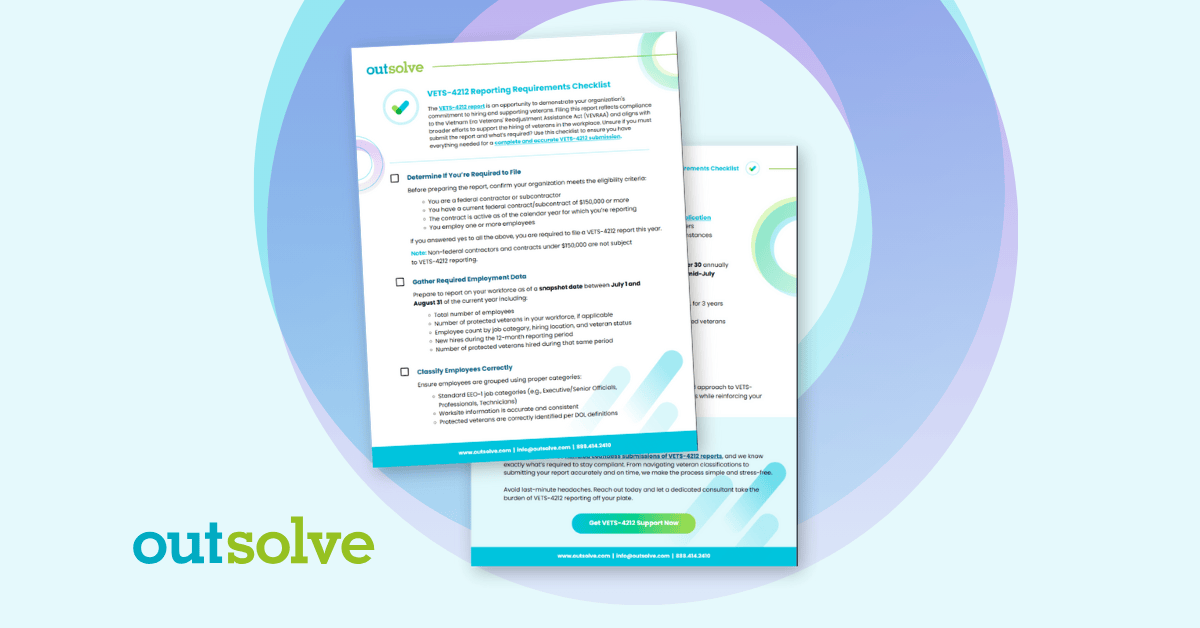4 min read
The DOJ’s Immigration Playbook: Statutes Used to Enforce I-9 Compliance
![]() OutSolve
:
Sep 29, 2025 1:54:40 PM
OutSolve
:
Sep 29, 2025 1:54:40 PM

This article is part of an ongoing legal series designed to provide insight and practical guidance on current and emerging workplace compliance issues. These insights shared by lawyers are based on their interpretation of existing regulations and proposed changes, and intended for informational purposes, not to be regarded as legal advice.
By law, employers must verify that every employee they hire is legally authorized to work in the U.S. But which laws are relied upon by the U.S. government to enforce that requirement? Many of the statutes it uses fall under the Immigration and Nationality Act. The Department of Justice (DOJ) may also enforce violations through anti-fraud laws in limited circumstances. Also, as of May 12, 2025, the DOJ has expanded its new Corporate Whistleblower Awards Pilot Program to include corporate immigration violations.
With enforcement on the rise, getting and remaining in I-9 compliance is more important than ever for employers. Outsolve offers resources to help you get organized and ensure you stay on top of your legal obligations.
The Immigration and Nationality Act (INA)
The primary source of U.S. immigration law is the Immigration and Nationality Act (INA). Several laws have amended the INA over the years. Those amendments make up the core of the government’s I-9 statutes:
- The Immigration Reform and Control Act of 1986 (IRCA)—established the primary I-9 enforcement system the government uses today;
- The Immigration Act of 1990—added document abuse provisions to the INA; and
- The Illegal Immigration Reform and Immigrant Responsibility Act of 1996 (IIRIRA)—created the current list of acceptable identification documents and established a pilot program that eventually became E-Verify.
These rules fall under INA sections 274A, 274B, and 274C. Let’s take a closer look at these important statutes.
Unauthorized Employment of Aliens: INA § 274A (8 U.S. Code § 1324a)
Section 274A does the following:
- Unauthorized workers. This statute makes hiring unauthorized workers unlawful, particularly if you knowingly hire such a person or continue to employ unauthorized workers after you discover they are not legally allowed to work in the country.
- Employment verification system. The statute creates this system and describes what documents individuals may use to prove their work authorization. It also requires employees to declare under penalty of perjury that their documents are valid and requires employers to retain I-9 forms for several years.
- Violation defense. The statute establishes a good-faith defense to violations if the employer uses that verification system and unknowingly hires an unauthorized worker.
This section is the heart of employment verification and unauthorized employment processes for U.S. workers.
Unfair Immigration-Related Employment Practices: INA § 274B (8 U.S. Code § 1324b)
Section 274B centers on unfair and discriminatory immigration-related employment practices. It declares that employers may not discriminate against employees or potential employees based on national origin or citizenship status.
These limitations apply specifically to the employment verification process. General discrimination against individuals based on national origin typically falls under Title VII of the U.S. Code, the Civil Rights Act of 1964.
Penalties for Document Fraud: INA § 274C (8 U.S. Code § 1324c)
Finally, Section 274C establishes penalties for document fraud in connection with the employment verification process, including:
- Forging, counterfeiting, altering, or falsely creating a document to meet employment verification requirements;
- Providing such a document;
- Using, attempting to use, obtaining, possessing, accepting, or receiving such a document;
- Using, attempting to use, providing, or attempting to provide a document that belongs to another person to meet employment verification requirements; and
- Accepting or receiving a document belonging to another person for employment verification.
The government may enforce these provisions through a cease and desist order and civil penalties for each violation.
Powers of Immigration Officers and Employees: INA § 287 (8 U.S. Code § 1357)
This code section establishes the government’s immigration enforcement authority. This authority includes authority for ICE employer immigration audits and workplace raids.
The Code of Federal Regulations
The Code of Federal Regulations (CFR) is a collection of regulations that interpret and provide enforcement mechanisms for provisions of the U.S. Code. INA-related CFR provisions primarily appear in Title 8 of the CFR, as they appear in Title 8 of the U.S. Code.
Executive agencies create provisions in the CFR, which makes them not technically “statutes,” since Congress must pass statutes. Yet, the CFR establishes the details of I-9 compliance and unauthorized employment, including:
- Title 8, Part 274a—Elaborates on employer requirements, including the verification system, what it means to continue to employ unauthorized workers, the good faith defense, enforcement procedures, and penalties;
- Title 8, Part 270—Defines document fraud with more specificity, establishes enforcement procedures, and establishes specific penalties;
- Title 28, Part 44—Establishes a judicial framework for interpreting claims of unfair discrimination in employment verification; and
- Title 28, Part 68—Establishes a judicial framework for violations of employment verification processes.
These CFR provisions expand on and clarify the INA provisions related to employment verification.
Anti-Fraud Measures
The government may also enforce employers’ I-9 obligations through anti-fraud laws. These laws include criminal prosecution, fine levies, and whistleblower provisions that may enable those who report unlawful employment practices to the government to share in damages awards.
Criminal Document and Immigration Fraud
I-9 compliance requires employees to provide documentation showing that they are authorized to work in the U.S. An employer who obtains or helps an employee to obtain a false or fraudulent identification document could be charged with criminal document fraud. Fraud and misuse of visas is a separate crime and another form of document fraud. Aiding and abetting document or immigration fraud by helping someone commit these crimes allows the government to punish you as if you had directly committed the crime yourself.
The Corporate Whistleblower Awards Pilot Program
In 2024, the DOJ launched the Corporate Whistleblower Awards Pilot Program. The program authorizes whistleblowers to receive a portion of the damages the government recovers from employers that violate a collection of government laws. The DOJ relies on the U.S. Attorney General’s appropriations authority to compensate whistleblowers who provide information or assistance that leads to a criminal or civil forfeiture of funds.
Whistleblowers can recover an award for providing truthful and original information about criminal misconduct leading to an asset forfeiture of $1,000,000 or more. On May 12, 2025, the DOJ added violations by companies of federal immigration laws. Thus, this provision authorizes recovery for complaints against employers for violating their I-9 obligations.
How to Avoid Violating Employment Authorization Laws
To avoid running afoul of these laws, consider:
- Establishing an organized internal system to track compliance,
- Regularly performing internal I-9 audits,
- Providing frequent training for HR professionals, and
- Establishing a way for employees to come to you if they have questions or concerns about your I-9 compliance.
When an employer may have participated in criminal misconduct, voluntary self-disclosure under the Corporate Enforcement and Voluntary Self-Disclosure Policy (CEP) can result in the government declining to prosecute or otherwise reducing fine amounts. To enjoy these benefits, you must disclose your misconduct within 120 days of when the DOJ receives a whistleblower report and fully cooperate in the investigation.
Staying in I-9 Compliance
While the risks associated with I-9 noncompliance can be severe, employers can minimize or even avoid those risks by maintaining an organized I-9 compliance program. To learn how OutSolve can help you get and stay organized, contact us today.
Founded in 1998, OutSolve has evolved into a premier compliance-driven HR advisory firm, leveraging deep expertise to simplify complex regulatory landscapes for businesses of all sizes. With a comprehensive suite of solutions encompassing HR compliance, workforce analytics, and risk mitigation consulting, OutSolve empowers organizations to navigate the intricate world of employment regulations with confidence.
Weekly OutLook
Featured Posts

VETS-4212 Reporting Requirements Checklist
Related Posts

The DOJ’s Immigration Playbook: Statutes Used to Enforce I-9 Compliance
This article is part of an ongoing legal series designed to provide insight and practical guidance on current and emerging workplace compliance...
.png)
Courts Seem Skeptical to Early DEI Certification Challenges
On September 11, 2025, the Fourth Circuit heard oral argument in one of the first cases to challenge the constitutionality of the two clauses in...

Workday AI Lawsuit Explained: Implications for HR
Artificial Intelligence (AI) is enhancing and transforming many parts of our lives, including recruitment and employment. As with any new process, AI...


.png)